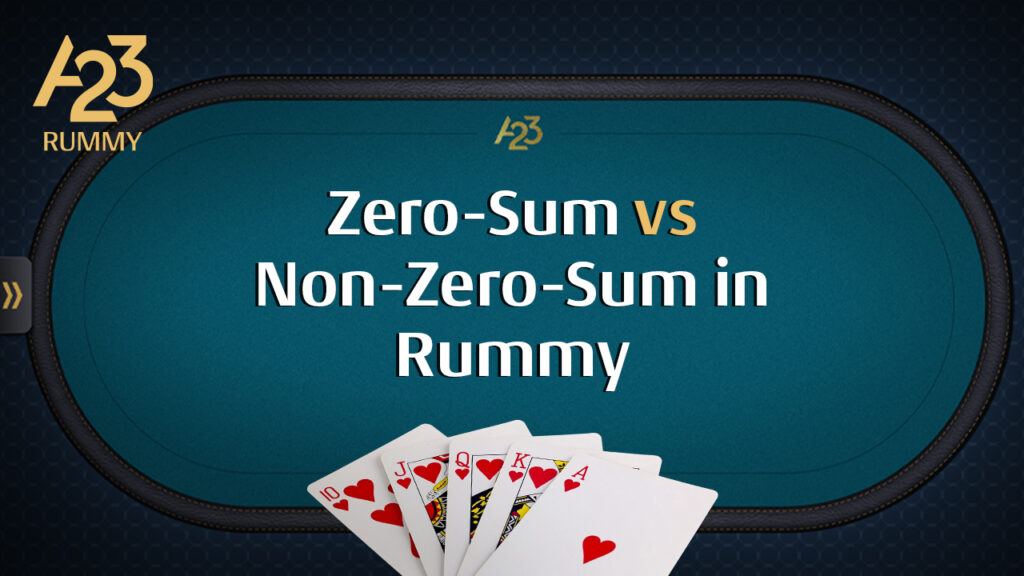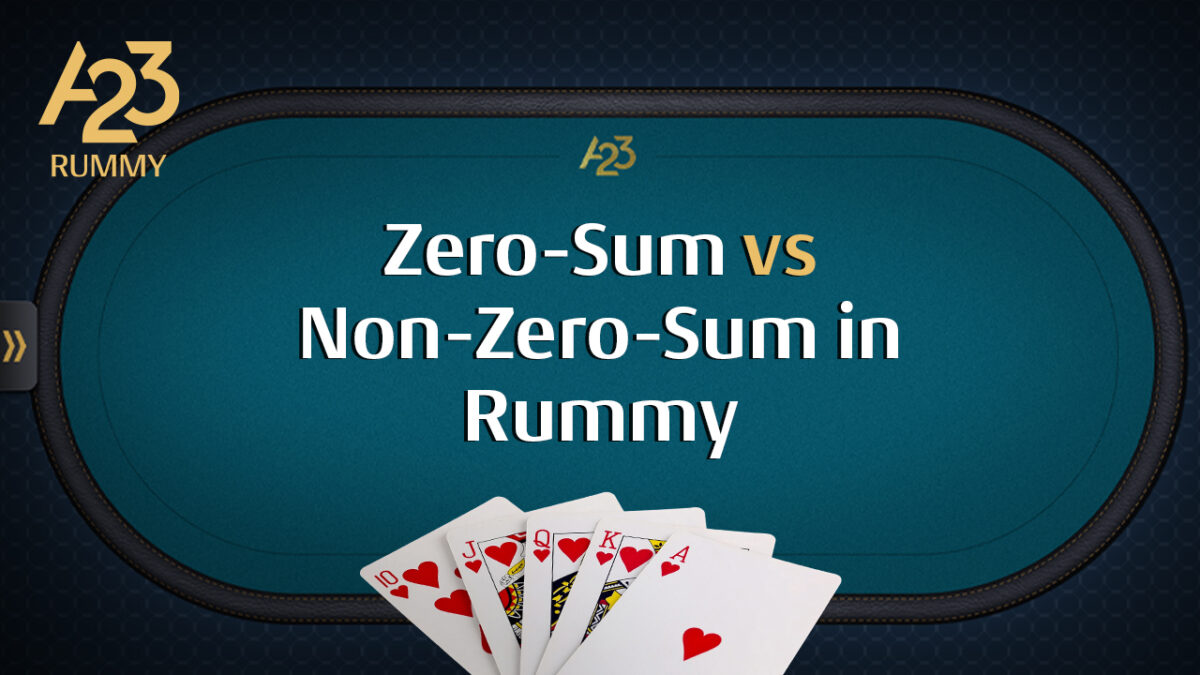
A branch of applied math, Game Theory provides a situational analysis in which different parties make independent as well as interdependent decisions. By accounting for strategic behavior, Game theory describes optimal decisions.
Formulated by John von Neumann, Game Theory can provide insights into parlour games, specifically Rummy.
Understanding Game Theory in Rummy
In Rummy, the main goal is to form sets and run with the cards they have in hand (or draw) and eliminate them. When Game Theory is applied to Rummy, the matches can be analyzed on the basis of the below theories:
- Minimax Strategy: Minimizing potential losses while maximizing profits
- Probability: Predicting the chances of drawing a particular cards
- Opponent Behavior: Understanding approaches and strategies implemented by other players
- Zero Sum Games: When one’s win is the direct result of another’s loss
- Non-Zero Sum Games: Losses and gains are in equilibrium and both players get something.
What Are Zero-Sum and Non-Zero-Sum Games?
In Game Theory, a Zero Sum Game occurs when the loss of players directly turns into a win for their opponent. When it comes to a Non-Zero Sum Game, both participants gain something without factoring into the loss of his/her opponent, and vice versa.
When it comes to playing Rummy, let’s take a more detailed approach.
Let us assume there are only two players. If the first player picks a card to improve their hand which is also needed by the other player, the match turns into a zero sum game. Here, the first player is gaining points when the second player is losing out.
However, this is not always the case. In another scenario, both players are drawing from the deck and getting a card that improves their hand. Now, the match becomes a non-zero sum game. Similarly, both players can hold a card that is beneficial to their opponent, making it a loss for both.
How Game Theory Applies to Card Games
By using Game theory, you can improve the following:
- Bluffing Strategy
- Analyze games as they progress
- Make strategic decisions
This helps you decide whether to play cooperatively or hold cards needed by your opponent.
Exploring Zero-Sum Games in Rummy
To have a zero sum game, players need to maximize their points while eliminating the chances for their rival to win.
Characteristics of Zero-Sum Games
In a two-player zero sum game, one’s loss is the other’s gain. For instance, suppose you draw a card from the deck that completes the game by handing you a win. The match will immediately turn into a zero sum game. Further, you can also draw a card that both you and your rival player need. Here too, the match becomes a zero sum game.
Since you either win a hand and gain points or lose a hand and award your rival your points, the conclusion of rummy gives a zero sum result.
Game Theory Aspects of Rummy
Some of the Game Theory tactics applied to rummy include:
- Nash Equilibrium: This accounts for optimal decision-making by accounting for your opponents.
- Iterative Thinking: Involving some back calculations, it helps deduce the best result for each course of action.
Strategies for Zero-Sum Rummy Games
Though the result of the online Rummy match will always be a zero sum game, you can also take this approach at various stages of the game. These include:
- Reading your rival’s strategy
- Blocking your rival’s moves
- Maximizing your points
Exploring Non-Zero Sum Games in Rummy
Rummy is not always a two-person game, often played between more players. In scenarios like this, players often concentrate on improving their own hand, rather than their opponents. To add, they can also team up with other players to block a particular opponent.
Further, even when playing a two-person game, it often happens that both players draw useful cards, thus improving both their hands.
Characteristics of Non-Zero Sum Games
In online rummy, non-zero sum games occur more often than not. While players do try to hide their strategy and try to hold cards to stop their opponents, not all players improve their hands at the expense of others.
Even cards dropped do not always benefit others. Sometimes, players focus more on dropping unnecessary cards from their own hand instead of thinking which card can benefit the rivals.
This often creates scenarios that benefit multiple players.
Strategies for Non-Zero Sum Rummy Games
When players focus more on others than their own hand, a friendly game of rummy often turns competitive. If you opt for a game where you balance improving your hand, and the output (points), you will lean more towards a non-zero sum game.
This also creates a scope for cooperative play, which is frowned upon.
Comparing Zero-Sum and Non-Zero Sum Scenarios in Rummy
Having both of these situations is common in online rummy. No rummy match is a completely non-zero or zero sum game.
When Do These Scenarios Arise?
If you are a frequent part of online rummy matches or use the Rummy app regularly, you will have seen the below situations:
- Some players only focus on improving their hand
- When players drop strategic cards to gauge their rivals
Casual vs Competitive Rummy Games
In casual games of rummy, the focus is more on improving our hand than on what our opponent is doing. This creates a non-zero sum situation since both players can draw cards that improve the situation for them both.
When playing in a competition, gauging a rival player’s strategy is just as important as improving our hand. Further, it also happens that players try to bait their opponents by dropping useful cards. In situations like this, two or more players gain from the action (a non-zero sum game).
Different Rule Variations Impacting Outcomes
In Gin Rummy, the game is always between two people. So, the result is also either a win or a loss, a zero sum game. However, many other rummy types are multiplayer. This often creates a non-zero sum result.
People also sometimes play in a collaborative manner, though frowned upon. This also creates a non-zero sum game.
Changing Tactics with the Game Type
Online rummy games can be nice and friendly or fast-paced and competitive. Whether you are playing to relax or win, it is always fun to try out a few strategies with Rummy.
If you are a seasoned player and good with numbers, you can try applying Game Theory. This will help chalk out a strategy that works best for you.
Some of these are:
Playing Aggressively in Zero-Sum Games
If you are playing to win and opting for a zero sum situation, you can be aggressive, hold strategic cards, and gauge and block your opponents. You can also try and bait your rival by discarding cards that are similar to what they are drawing (cards in the same suit or others).
Leveraging Cooperation in Non-Zero Sum Games
While collaborating with other players to corner your rival is discouraged, all players can drop strategic cards and draw from the discard to improve their hand.
Enhancing Your Rummy Skills with Strategic Insights
More often than not, we observe the discard pile to root out our rival’s strategy. By calculating your odds with Game Theory, you can gauge your rival’s tactics, create better strategies, and get an estimate on the chances of your win.
Mastering Game Theory in Rummy
The market for online rummy in India is set to grow at a CAGR of 11.5% from 2021 – 2026. Though rummy was designed to be a parlor game, with the rise of online rummy people who play competitively take a very strategic approach. This includes reading their rivals, bluffing, and most of all Game Theory.
By approaching Rummy as an incomplete game, you can broaden the application of Game Theory. With Game Theory zero sum and non-zero sum game, you have better chances of evaluating your odds of winning the hand when playing online rummy.





 Jan 10, 2025
Jan 10, 2025
Note: that your message will not be displayed until it is reviewed by the moderator!